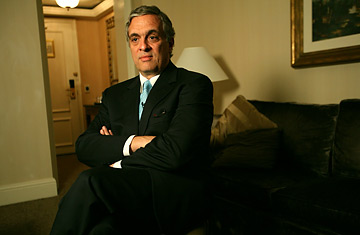
George Tenet, former CIA director, listens during an interview in New York, Monday April 30, 2007.
(2 of 3)
TENET: Look, look, look, were we aware that neocons in particular don't like us and think we don't evaluate threats the way we should evaluate threats, we're too close to the Sunnis, we have not a particularly good view of what — you know, we understand all that.
TIME: Did you ever feel that the West Wing pushed the agency to produce a certain outcome?
TENET: On the WMD question, absolutely not. They didn't even really know the [national intelligence] estimate was under way because we were doing it at the request of Congress.
TIME: But what about when it came to linking Saddam and Al-Qaeda?
TENET: Well, the al-Qaeda thing, you've got quotes from analysts, did they feel that we were being pushed? Yes. Did they buckle? No. We understood all that. But we were good boys and girls, and we understand there's gambling in this. We understand how this works. That was a different issue because of the way it was, you see, that issue is different because there was always the urge, the attempt to create command linkages where none existed. There was always that push, but at the end of the day, we never went that far and we never buckled.
TIME: But you said in the book that the CIA was in some places more assertive with the President than it was elsewhere—
TENET: I think that we were more assertive on aluminum tubes. We were not as assertive on saying [Saddam was going to have] a nuclear weapon real soon, but on some issues. Now, do I think the analysts ever would have said he has no weapons? I seriously doubt it.
TIME: How come the CIA trusted the source, codenamed Curveball, who turned out to be a fabricator? How does that happen? Did you know even who he was?
TENET: Well, I didn't know his name, no. I mean, I know a lot about Curveball. So, you know, we're working throughout this period. We're trying to get direct access to him, and we can't have direct access to him But so you've got this, you know, indirect access, analysts doing the validation, lots of what he was saying made sense The implication, of course, as you look at this, is this an organization in some sort of meltdown or something? Well, no, because the whole ethos of the place is report what you've got. If it's not good news, when someone says fabricate in our business, you push it up, you stop the train. At the end of the day, we could have saved a lot of pain in the estimate. We could have saved the Secretary of State a whole lot of pain.
TIME: We learned in the Libby trial that Vice president Cheney's Chief of Staff Scooter Libby arranged to have parts of the CIA's intelligence work declassified and then leaked to make it appear Saddam wanted a weapon. Did you know that was going on?
TENET: I don't know, other than to say this was a revelation to me. I don't know. I don't know what they were doing with you guys. Only you guys know what they were doing with you guys.
TIME: Are you confident that the U.S. never crossed the line into torture?
TENET: Yes.
TIME: Why?
TENET: Look, first of all, torture doesn't work. Second of all, the vast preponderance of data, it's not about the harshness of the techniques, it's about smart people. We don't believe in torture. Look, this is a country of laws. There's authorization. There's legal opinions. We did this by the numbers. We corroborate this stuff. We have other sources. There are plot lines that are broken. They give us enormous access and understanding of al-Qaeda, insights into operatives that we didn't know about. Enormous value to us. Huge insight. You want to talk about connecting dots, you connect dots as you have never before.
